- Home
- Richard Adams
Watership Down Page 5
Watership Down Read online
Page 5
"Keep at it!" cried Bigwig. "Come in behind it! They're cowards! They only attack helpless rabbits."
But already the crow was making off, flying low with slow, heavy wing beats. They watched it clear the further hedge and disappear into the wood beyond the river. In the silence there was a gentle, tearing sound as a grazing cow moved nearer.
Bigwig strolled over to Pipkin, muttering a ribald Owsla lampoon.
"Hoi, hoi u embleer Hrair,
M'saion ulé hraka vair."[6]
"Come on, Hlao-roo," he said. "You can get your head out now. Having quite a day, aren't we?"
He turned away and Pipkin tried to follow him. Hazel remembered that Fiver had said he thought he was injured. Now, as he watched him limping and staggering up the slope, it occurred to him that he might actually be wounded in some way. He kept trying to put his near-side front paw to the ground and then drawing it up again, hopping on three legs.
"I'll have a look at him as soon as they're settled under cover," he thought. "Poor little chap, he won't be able to get much further like that."
At the top of the slope Buckthorn was already leading the way into the beanfield. Hazel reached the hedge, crossed a narrow turf verge on the other side and found himself looking straight down a long, shadowy aisle between two rows of beans. The earth was soft and crumbling, with a scattering of the weeds that are found in cultivated fields-fumitory, charlock, pimpernel and mayweed, all growing in the green gloom under the bean leaves. As the plants moved in the breeze, the sunlight dappled and speckled back and forth over the brown soil, the white pebbles and weeds. Yet in this ubiquitous restlessness there was nothing alarming, for the whole forest took part in it and the only sound was the soft, steady movement of the leaves. Far along the bean row Hazel glimpsed Buckthorn's back and followed him into the depths of the field.
Soon after, all the rabbits had come together in a kind of hollow. Far around, on all sides, stood the orderly rows of beans, securing them against hostile approach, roofing them over and covering their scent. They could hardly have been safer underground. Even a little food could be had at a pinch, for here and there were a few pale twists of grass and here and there a dandelion.
"We can sleep here all day," said Hazel. "But I suppose one of us ought to stay awake; and if I take the first turn it'll give me a chance to have a look at your paw, Hlao-roo. I think you've got something in it."
Pipkin, who was lying on his left side, breathing quickly and heavily, rolled over and stretched out his front paw, underside turned upward. Hazel peered closely into the thick, coarse hair (a rabbit's foot has no pads) and after a few moments saw what he had expected-the oval shank of a snapped-off thorn sticking out through the skin. There was a little blood and the flesh was torn.
"You've got a big thorn in there, Hlao," he said. "No wonder you couldn't run. We'll have to get it out."
Getting the thorn out was not easy, for the foot had become so tender that Pipkin winced and pulled away even from Hazel's tongue. But after a good deal of patient effort Hazel succeeded in working out enough of the stump to get a grip with his teeth. The thorn came out smoothly and the wound bled. The spine was so long and thick that Hawkbit, who happened to be close by, woke Speedwell to have a look at it.
"Frith above, Pipkin!" said Speedwell, sniffing at the thorn where it lay on a pebble. "You'd better collect a few more like that: then you can make a notice board and frighten Fiver. You might have poked the lendri's eye out for us, if you'd only known."
"Lick the place, Hlao," said Hazel. "Lick it until it feels better and then go to sleep."
10. The Road and the Common
Timorous answered, that they… had got up that difficult place: but, said he, the further we go, the more danger we meet with; wherefore we turned, and are going back again.
John Bunyan, The Pilgrim's Progress
After some time, Hazel woke Buckhorn. Then he scratched a shallow nest in the earth and slept. One watch succeeded another through the day, though how the rabbits judged the passing of the time is something that civilized human beings have lost the power to feel. Creatures that have neither clocks nor books are alive to all manner of knowledge about time and the weather; and about direction, too, as we know from their extraordinary migratory and homing journeys. The changes in the warmth and dampness of the soil, the falling of the sunlight patches, the altering movement of the beans in the light wind, the direction and strength of the air currents along the ground-all these were perceived by the rabbit awake.
The sun was beginning to set when Hazel woke to see Acorn listening and sniffing in the silence, between two white-skinned flints. The light was thicker, the breeze had dropped and the beans were still. Pipkin was stretched out a little way away. A yellow-and-black burying beetle, crawling across the white fur of his belly, stopped, waved its short, curved antennae and then moved on again. Hazel grew tense with sudden misgiving. He knew that these beetles come to dead bodies, on which they feed and lay their eggs. They will dig away the earth from under the bodies of small creatures, such as shrew mice and fallen fledglings, and then lay their eggs on them before covering them with soil. Surely Pipkin could not have died in his sleep? Hazel sat up quickly. Acorn started and turned toward him and the beetle scurried away over the pebbles as Pipkin moved and woke.
"How's the paw?" said Hazel.
Pipkin put it to the ground. Then he stood on it.
"It feels much better," he said. "I think I shall be able to go as well as the others now. They won't leave me behind, will they?"
Hazel rubbed his nose behind Pipkin's ear. "No one's going to leave anyone else behind," he said. "If you had to stay, I'd stay with you. But don't pick up any more thorns, Hlao-roo, because we may have to go a long way."
The next moment all the rabbits leaped up in panic. From close at hand the sound of a shot tore across the fields. A peewit rose screaming. The echoes came back in waves, like a pebble rolling round a box, and from the wood across the river came the clattering of wood pigeons' wings among the branches. In an instant the rabbits were running in all directions through the bean rows, each one tearing by instinct toward holes that were not there.
Hazel stopped short on the edge of the beans. Looking about him, he could see none of the others. He waited, trembling, for the next shot: but there was silence. Then he felt, vibrating along the ground, the steady tread of a man going away beyond the crest over which they had come that morning. At that moment Silver appeared, pushing his way through the plants close by.
"I hope it's the crow, don't you?" said Silver.
"I hope no one's been silly enough to bolt out of this field," answered Hazel. "They're all scattered. How can we find them?"
"I don't think we can," said Silver. "We'd better go back to where we were. They'll come in time."
It was in fact a long time before all the rabbits had come back to the hollow in the middle of the field. As he waited, Hazel realized more fully than ever how dangerous was their position, without holes, wandering in country they did not know. The lendri, the dog, the crow, the marksman-they had been lucky to escape them. How long would their luck hold? Would they really be able to travel on as far as Fiver's high place-wherever it might be?
"I'd settle for any decent, dry bank, myself," he thought, "as long as there was some grass and no men with guns. And the sooner we can find one the better."
Hawkbit was the last to return and as he came up Hazel set off at once. He looked cautiously out from among the beans and then darted into the hedgerow. The wind, as he stopped to sniff it, was reassuring, carrying only the scents of evening dew, may and cow dung. He led the way into the next field, a pasture: and here they all fell to feeding, nibbling their way over the grass as easily as though their warren were close by.
When he was halfway across the field, Hazel became aware of a hrududu approaching very fast on the other side of the further hedge. It was small and less noisy than the farm tractor which he had sometimes watched
from the edge of the primrose wood at home. It passed in a flash of man-made, unnatural color, glittering here and there and brighter than a winter holly tree. A few moments later came the smells of petrol and exhaust. Hazel stared, twitching his nose. He could not understand how the hrududu could move so quickly and smoothly through the fields. Would it return? Would it come through the fields faster than they could run, and hunt them down?
As he paused, wondering what was best to be done, Bigwig came up.
"There's a road there, then," he said. "That'll give some of them a surprise, won't it?"
"A road?" said Hazel, thinking of the lane by the notice board. "How do you know?"
"Well, how do you suppose a hrududu can go that fast? Besides, can't you smell it?"
The smell of warm tar was now plain on the evening air.
"I've never smelled that in my life," said Hazel with a touch of irritation.
"Ah," said Bigwig, "but then you were never sent out stealing lettuces for the Threarah, were you? If you had been, you'd have learned about roads. There's nothing to them, really, as long as you let them alone by night. They're elil then, all right."
"You'd better teach me, I think," said Hazel. "I'll go up with you and we'll let the others follow."
They ran on and crept through the hedge. Hazel looked down at the road in astonishment. For a moment he thought that he was looking at another river-black, smooth and straight between its banks. Then he saw the gravel embedded in the tar and watched a spider running over the surface.
"But that's not natural," he said, sniffing the strange, strong smells of tar and oil. "What is it? How did it come there?"
"It's a man thing," said Bigwig. "They put that stuff there and then the hrududil run on it-faster than we can; and what else can run faster than we?"
"It's dangerous, then? They can catch us?"
"No, that's what's so odd. They don't take any notice of us at all. I'll show you, if you like."
The other rabbits were beginning to reach the hedge as Bigwig hopped down the bank and crouched on the verge of the road. From beyond the bend came the sound of another approaching car. Hazel and Silver watched tensely. The car appeared, flashing green and white, and raced down toward Bigwig. For an instant it filled the whole world with noise and fear. Then it was gone and Bigwig's fur was blowing in the whack of wind that followed it down the hedges. He jumped back up the bank among the staring rabbits.
"See? They don't hurt you," said Bigwig. "As a matter of fact, I don't think they're alive at all. But I must admit I can't altogether make it out."
As on the riverbank, Blackberry had moved away and was already down on the road on his own account, sniffing out toward the middle, halfway between Hazel and the bend. They saw him start and jump back to the shelter of the bank.
"What is it?" said Hazel.
Blackberry did not answer, and Hazel and Bigwig hopped toward him along the verge. He was opening and shutting his mouth and licking his lips, much as a cat does when something disgusts it.
"You say they're not dangerous, Bigwig," he said quietly. "But I think they must be, for all that."
In the middle of the road was a flattened, bloody mass of brown prickles and white fur, with small black feet and snout crushed round the edges. The flies crawled upon it, and here and there the sharp points of gravel pressed up through the flesh.
"A yona," said Blackberry. "What harm does a yona do to anything but slugs and beetles? And what can eat a yona?"
"It must have come at night," said Bigwig.
"Yes, of course. The yonil always hunt by night. If you see them by day, they're dying."
"I know. But what I'm trying to explain is that at night the hrududil have great lights, brighter than Frith himself. They draw creatures toward them, and if they shine on you, you can't see or think which way to go. Then the hrududu is quite likely to crush you. At least, that's what we were taught in the Owsla. I don't intend to try it."
"Well, it will be dark soon," said Hazel. "Come on, let's get across. As far as I can see, this road's no good to us at all. Now that I've learned about it, I want to get away from it as soon as I can."
By moonrise they had made their way through Newtown churchyard, where a little brook runs between the lawns and under the path. Wandering on, they climbed a hill and came to Newtown Common-a country of peat, gorse and silver birch. After the meadows they had left, this was a strange, forbidding land. Trees, herbage, even the soil-all were unfamiliar. They hesitated among the thick heather, unable to see more than a few feet ahead. Their fur became soaked with the dew. The ground was broken by rifts and pits of naked black peat, where water lay and sharp white stones, some as big as a pigeon's, some as a rabbit's skull, glimmered in the moonlight. Whenever they reached one of these rifts the rabbits huddled together, waiting for Hazel or Bigwig to climb the further side and find a way forward. Everywhere they came upon beetles, spiders and small lizards which scurried away as they pushed through the fibrous, resistant heather. Once Buckthorn disturbed a snake, and leaped into the air as it whipped between his paws to vanish down a hole at the foot of a birch.
The very plants were unknown to them-pink lousewort with its sprays of hooked flowers, bog asphodel and the thin-stemmed blooms of the sundews, rising above their hairy, fly-catching mouths, all shut fast by night. In this close jungle all was silence. They went more and more slowly, and made long halts in the peat cuts. But if the heather itself was silent, the breeze brought distant night sounds across the open common. A cock crowed. A dog ran barking and a man shouted at it. A little owl called "Kee-wik, kee-wik" and something-a vole or a shrew-gave a sudden squeal. There was not a noise but seemed to tell of danger.
Late in the night, toward moonset, Hazel was looking up from a cut where they were crouching to a little bank above. As he was wondering whether to climb up to it, to see whether he could get a clear view ahead, he heard a movement behind him and turned to find Hawkbit at his shoulder. There was something furtive and hesitant about him and Hazel glanced at him sharply, wondering for a moment whether he could have sickness or poison on him. "Er-Hazel," said Hawkbit, looking past him into the face of the dreary black cliff. "I-er-that is to say we-er-feel that we-well, that we can't go on like this. We've had enough of it."
He stopped. Hazel now saw that Speedwell and Acorn were behind him, listening expectantly. There was a pause.
"Go on, Hawkbit," said Speedwell, "or shall I?"
"More than enough," said Hawkbit, with a kind of foolish importance.
"Well, so have I," answered Hazel, "and I hope there won't be much more. Then we can all have a rest."
"We want to stop now," said Speedwell. "We think it was stupid to come so far."
"It gets worse and worse the further we go," said Acorn. "Where are we going and how long will it be before some of us stop running for good and all?"
"It's the place that worries you," said Hazel. "I don't like it myself, but it won't go on forever."
Hawkbit looked sly and shifty. "We don't believe you know where we are going," he said. "You didn't know about the road, did you? And you don't know what there is in front of us."
"Look here," said Hazel, "suppose you tell me what you want to do and I'll tell you what I think about it."
"We want to go back," said Acorn. "We think Fiver was wrong."
"How can you go back through all we've come through?" replied Hazel. "And probably get killed for wounding an Owsla officer, if you ever do get back? Talk sense, for Frith's sake."
"It wasn't we who wounded Holly," said Speedwell.
"You were there and Blackberry brought you there. Do you think they won't remember that? Besides-"
Hazel stopped as Fiver approached, followed by Bigwig.
"Hazel," said Fiver, "could you come up on the bank with me for a few moments? It's important."
"And while you're there," said Bigwig, scowling round at the others from under the great sheaf of fur on his head, "I'll just have a few wor
ds with these three. Why don't you get washed, Hawkbit? You look like the end of a rat's tail left in a trap. And as for you, Speedwell-"
Hazel did not wait to hear what Speedwell looked like. Following Fiver, he scrambled up the lumps and shelves of peat to the overhang of gravelly earth and thin grass that topped them. As soon as Fiver had found a place to clamber out, he led the way along the edge to the bank which Hazel had been looking at before Hawkbit spoke to him. It stood a few feet above the nodding, windy heather and was open and grassy at the top. They climbed it and squatted down. To their right the moon, smoky and yellow in thin night cloud, stood over a clump of distant pine trees. They looked southward across the dismal waste. Hazel waited for Fiver to speak, but he remained silent.
"What was it you wanted to say to me?" asked Hazel at last.
Fiver made no reply and Hazel paused in perplexity. From below, Bigwig was just audible.
"And you, Acorn, you dog-eared, dung-faced disgrace to a gamekeeper's gibbet, if I only had time to tell you-"
The moon sailed free of the cloud and lit the heather more brightly, but neither Hazel nor Fiver moved from the top of the bank. Fiver was looking far out beyond the edge of the common. Four miles away, along the southern skyline, rose the seven-hundred-and-fifty-foot ridge of the downs. On the highest point, the beech trees of Cottington's Clump were moving in a stronger wind than that which blew across the heather.
"Look!" said Fiver suddenly. "That's the place for us, Hazel. High, lonely hills, where the wind and the sound carry and the ground's as dry as straw in a barn. That's where we ought to be. That's where we have to get to."
Hazel looked at the dim, far-off hills. Obviously, the idea of trying to reach them was out of the question. It might well prove to be all they could do to find their way across the heather to some quiet field or copse bank like those they had been used to. It was lucky that Fiver had not come out with this foolish notion in front of any of the others, especially as there was trouble enough already. If only he could be persuaded to drop it here and now, there would be no harm done-unless, indeed, he had already said anything to Pipkin.

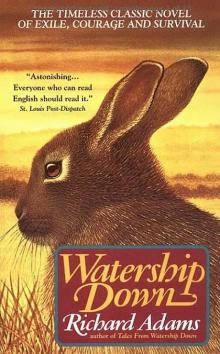 Watership Down
Watership Down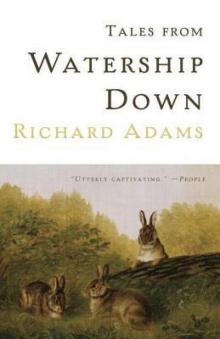 Tales From Watership Down
Tales From Watership Down Maia
Maia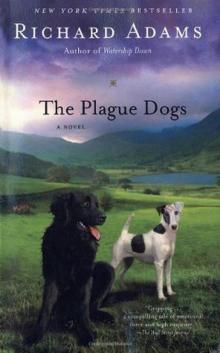 The Plague Dogs
The Plague Dogs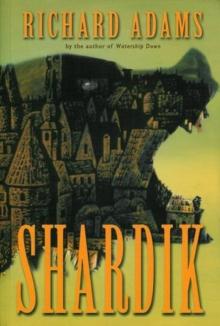 Shardik
Shardik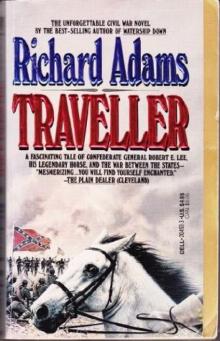 Traveller
Traveller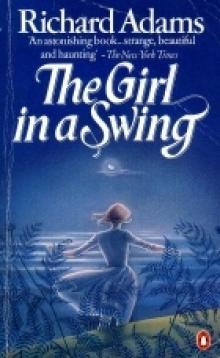 The Girl in a Swing
The Girl in a Swing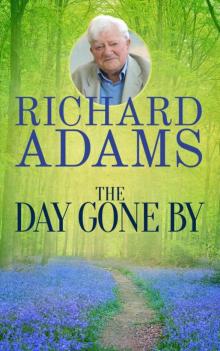 The Day Gone By
The Day Gone By Daniel
Daniel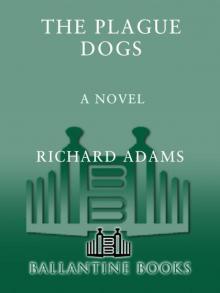 The Plague Dogs: A Novel
The Plague Dogs: A Novel